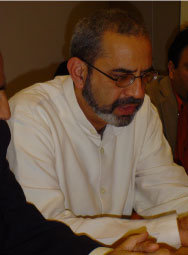An Evening with Poet
Irfan Malik
By Ali Hasan Cemendtaur
 Irfan Malik
Irfan Malik |
A small gathering of Bay Area
Punjabi poets and their fans took place last Saturday at
the San Francisco Library. The get-together was arranged
to honor the distinguished Punjabi poet Irfan Malik from
Boston. Irfan Malik has five books to his credit: two translations
('Ghoonghe', Urdu translation of Swedish short stories and
'Vaddha hoia ghaira', Punjabi translation of Swedish poetry)
and three books of Punjabi poetry (Vich jagrate sutti taangh,
Akath, and Noon Ghuna.) The translations are the result
of Malik's eleven-year stay in Sweden.
The local Bay Area Punjabi poet s -- Kulwinder, Parminder
Parwana, Resham Sidhu, Major Bhupinder Daler and Jagjit
Naushehrvi - attending the literary gathering are members
of Vishav Punjabi Sahit Academy, a Bay Area group of Punjabi
poets. Some heartwarming poetry, including a poem on the
recent Asian Tsunami tragedy (by Major Bhupinder Daler),
was read. Besides reading selections from his published
books Irfan Malik informally spoke with the audience and
explained the motivations behind his creative work. He told
the listeners he was intrigued by the influence of script
on the way things are said in a particular language and
on the ultimate evolution of that language.
He elaborated on this point by giving examples of original
Punjabi letters with nasal sounds that are still used by
the Punjabis of the Indian Punjab, but are being forgotten
by the Pakistani Punjabis. The visiting scholar's books
were available for purchase at the gathering. This writer
quickly browsed 'Ghoonghe' and 'Akath.' 'Ghoonghe' is a
collection of Urdu translation of nine Swedish short stories
written by Lars Ahlin, Stig Dagerman, Lars Gyllensten, Nina
Lekander, Torgny Lindgren, Bodil Malmsten, Goran Nordstrom,
August Strindberg, and Hjalmar Soderberg. The collection
has been titled 'Ghoonghe' based on Goran Nordstrom's story
titled 'Fossils.' A good translation of the English word
'fossil' doesn't exist in Urdu (Ghoonghe is not the correct
translation of fossils); puritans of Urdu - for whom borrowing
from Farsi or Arabic is more acceptable than borrowing from
English -- use the Arabic word 'Hajr.' Malik translated
fossils as 'Ghoonghe' probably because Nordstrom's story
is set at a beach. The merit of Malik's translations lies
in them being direct from Swedish to Urdu and Punjabi.
Most translations in Urdu from foreign languages come through
English. 'Ghoonghe' should be further welcomed because it
contains translated works of Swedish writers that don't
even exist in English - all except Stig Dagerman, August
Strindberg, and Hjalmar Soderberg. A discussion on the evolution
of languages continued beyond the SF Library gathering.
It was noted that the establishment of the Aligarh Muslim
University earned Urdu the recognition of the lingua franca
of the Muslims of the subcontinent. That Dr. Iqbal was the
main force in making Urdu as a language of communication,
acceptable to the Punjabis.
That the creation of Pakistan changed the linguistic landscape
of the subcontinent -- Urdu erstwhile seen as a friendly
language was resented when thrust upon people unwilling
to accept it as their primary language. One thing about
the literary evening that remained with this writer was
how profusely the SF Library is infested with foul smelling
homeless people. The homeless were everywhere in the library
and they seemed to be having a not-taken-a-bath-in-the-last-x-days
competition going on among them. A little research over
the Internet revealed that the SF homeless feel very associated
with the city library. The homeless have been attending
the Library Commission meetings and have recommended keeping
the library open for longer hours. [See here: http://sfpl.lib.ca.us/librarylocations/libcomm/minutes052003.htm]
-------------------------------------------------------------------------------------

